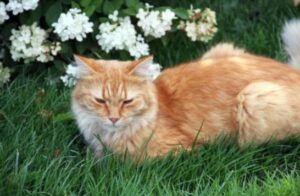Are Hydrangeas Poisonous to Cats?

Hydrangeas are prized for their colorful flowers, but these flowering shrubs can make cats sick. If they bite on any part of the plant. Although some types of hydrangea are more poisonous than others, the plants are so robust that each has the potential to poison cats. Here’s how to keep your kitty safe and secure.
Why Are Hydrangeas Poisonous to Cats?
Hydrangeas contain chemicals called glycosides, which can be toxic to cats and other animals. When the plant is chewed or eaten, the chemical is released and causes various symptoms such as vomiting, and diarrhea.
Although some types of hydrangeas can be more poisonous than others, any type of plant can be dangerous to cats if eaten in large quantities. If you suspect that your cat has eaten any part of a hydrangea or any other plant, contact your veterinarian immediately.
Signs of Hydrangea Poisoning in Cats
Some symptoms of hydrangeas appear in cats. Some symptoms of poisoning include:
Vomiting
Diarrhea
Loss of apatite
Lethargy, weakness, or depression
Drooling
Difficulty breathing
Seizures
Pale or blue gums
Rapid heart rate
If you notice these or any other signs of illness or suspect that your cat has eaten any part of the hydrangea plant, seek veterinary care immediately.
What to do if your cat eats hydrangea
If you see your cat nibbling on a hydrangea plant, remove it from the area immediately to prevent further ingestion. Contact your veterinarian immediately to let them know what happened. And check with your cat’s vet, that you bring your cat in for an exam, or they can give you instructions on what to do next. If your cat has eaten hydrangeas, you may want to have the cat checked by a vet if you feel like it has eaten a small portion of the hydrangeas.
How to Prevent Hydrangea Poisoning in Cats
While hydrangeas can add a pop of color and charm to your garden or indoor space, keeping them around can be dangerous if your cats are in the same area. If you have hydrangea plants in your home or yard, make sure they are placed in a place that is inaccessible to your cat. If you keep hydrangeas away from your cat, your cat will not get sick.
What happens to a cat when it eats hydrangeas?
Eating hydrangea flowers can cause your cat to experience vomiting, loss of appetite, lethargy or depression, difficulty breathing, etc.
- Vomiting
Vomiting describes the active evacuation of food from the stomach. When a cat eats dirty things, an upset stomach causes vomiting. But it is a medical symptom that occurs with many diseases and problems.
- Loss of appetite
Is your cat not eating? A cat that suddenly stops eating although cats are known to be picky eaters, it is not uncommon to refuse if your cat stops eating for several weeks, or two to three days. If she eats food later, the doctor should check the cat’s condition.
- Lethargy, weakness, or depression
If your cat is showing signs of lethargy, weakness, or depression, it’s important to pay close attention, as these may be signs of underlying health problems. These symptoms can be caused by a variety of factors, including infections, chronic illnesses, or even emotional stress. It is important to monitor for any additional symptoms and consult a veterinarian immediately to determine the cause and ensure your friend receives appropriate care and treatment.
- Difficulty breathing
Difficulty breathing in cats is a serious concern that can indicate a range of underlying health problems. Cats experiencing respiratory distress may have symptoms such as rapid or labored breathing, open-mouth breathing, wheezing, or coughing. Symptoms may appear. your cat is having difficulty breathing, consult a vet.
- Preventing Exposure
If you don’t want to make your cat sick, watch out for these signs:
- Plant placement:
If possible, avoid placing hydrangeas in areas where your cat has access. This can be especially difficult if you have outdoor cats, but keeping indoor plants out of reach is a good start.
- Alternative Plants:
Choose cat-friendly plants that are safe to eat. Some safe alternatives include catnip, catnip, and spider plant.
For more info click here

One Comment on “Are Hydrangeas Poisonous to Cats?”